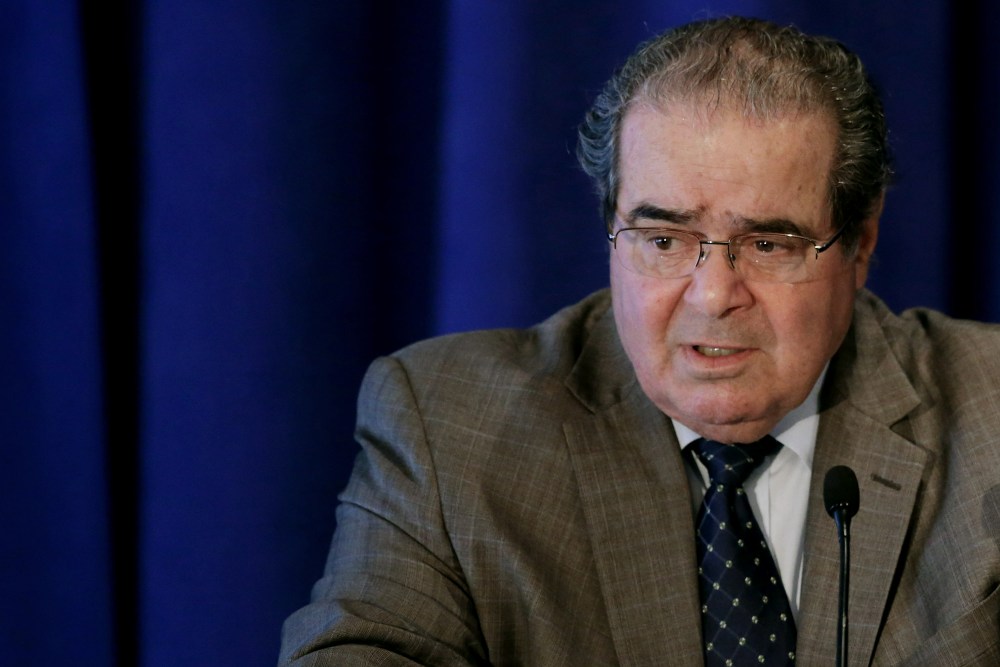Justice Antonin Scalia believes that the Supreme Court’s ruling in Obergefell v. Hodges, which legalized same-sex marriage nationwide, is a “threat to American democracy.”
In a dissent brimming with vitriolic snark, the justice argues that by forcing all states to recognize same-sex marriage, the court has violated “a principle even more fundamental than no taxation without representation: no social transformation without representation.”
The crux of Scalia’s argument is that, contrary to the ruling of the majority, the equal protection clause of the 14th Amendment does not require the government to include same-sex couplings in its definition of marriage:
“When the Fourteenth Amendment was ratified in 1868, every State limited marriage to one man and one woman, and no one doubted the constitutionality of doing so. That resolves these cases. When it comes to determining the meaning of a vague constitutional provision—such as ‘due process of law’ or ‘equal protection of the laws’—it is unquestionable that the People who ratified that provision did not understand it to prohibit a practice that remained both universal and uncontroversial in the years after ratification.”
Thus, Scalia argues that if the country wishes to legalize same-sex marriage, it must do so through democratically enacted legislation, or through the ratification of a new constitutional amendment, and not through five unelected justices substituting their “reasoned judgment” of the 14th amendment for the will of those who ratified it.
Scalia’s commitment to this brand of “textualism” isn’t too surprising. But in his eight-page dissent, he offered a few more unusual opinions, including one that may embolden some states and individuals to nullify today’s ruling:
1. Anthony Kennedy should write fortune cookies
Much of Scalia’s dissent reads less like a judicial opinion than a piece of withering literary criticism.
Scalia writes that Justice Anthony Kennedy’s majority opinion is written “in a style that is as pretentious as its content is egotistic,” overflowing with “mummeries,” “silly extravagances,” and “straining-to-be-memorable passages.”
In case those phrases weren’t enough for the reader to appreciate the depth of his contempt for Kennedy’s prose, Scalia provides this remarkable footnote:
“If even as the price to be paid for a fifth vote, I ever joined an opinion for the Court that began ‘The constitution promises liberty to all within its reach, a liberty that includes certain specific rights that allow persons, within a lawful realm, to define and express their identity,’ I would hide my head in a bag. The Supreme Court of the United States has descended from the disciplined legal reasoning of John Marshall and Joseph Story to the mystical aphorisms of a fortune cookie.”
And if you think that writing a full paragraph disparaging your fellow justice’s “extravagant” writing seems, well, “extravagant,” Scalia would say that dissenters have the right to be indulgent:
“It is one thing for separate concurring or dissenting opinions to contain extravagances, even silly extravagances, of thought and expression; it is something else for the official opinion of the Court to do so.”
2. Hippies know the truth about what marriage does your sex-life
In his majority opinion, Kennedy writes: “The nature of marriage is that, through its enduring bond, two persons together can find other freedoms, such as expression, intimacy, and spirituality.”
To which Scalia responds:
“(Really? Who ever thought that intimacy and spirituality [whatever that means] were freedoms? And if intimacy is, one would think Freedom of Intimacy is abridged rather than expanded by marriage. Ask the nearest hippie.”
The Huffington Post took Scalia’s suggestion, and asked hippies on the White House lawn about whether marriage expands intimacy. Paige Carambio, who attended her first Grateful Dead concert at “the age of 11 or 12,” offered the following response:
“If his dissent is about him being bummed that monogamy is boring, then he is not doing something right,” she said. “This says way more about himself. He and his wife might want to consider couples’ counseling or spicing things up a little.”
3. Californians are not “genuine westerners”











